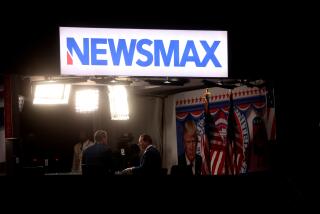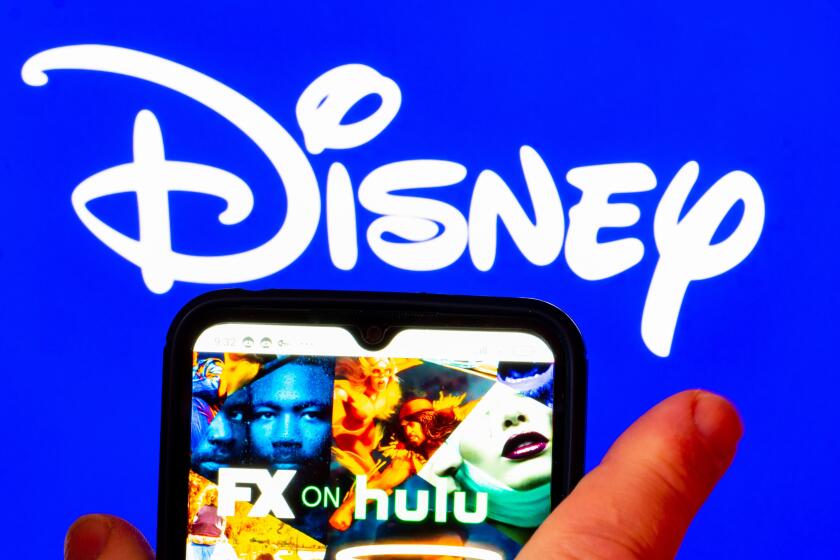Why media stocks are booming one year after coronavirus shutdown

- Share via
One year ago, investors took a grim view of legacy media companies.
The economic toll of the COVID-19 pandemic was coming into focus: Theme parks and movie theaters were shuttered, sporting events were canceled, and TV and film production ground to a halt. Wall Street responded by bludgeoning shares of traditional media, including Walt Disney Co., ViacomCBS Inc. and Discovery Inc.
One year later, these stocks have not only regained their value, they have soared to stratospheric heights.
On Wednesday, Disney stock closed at $195.06 — an extraordinary rebound from a year ago when its shares traded around $85. Since March 23, 2020, Disney’s market value has increased nearly $200 billion. The Burbank entertainment behemoth now is worth $354 billion.
ViacomCBS, Discovery, Comcast Corp., Fox Corp. and AMC Networks Inc. also have benefited despite ongoing challenges, including consumer cord-cutting that has dimmed the prospects of their cash-cow cable TV channels.
There are several reasons for the boom, including the stock market’s overall strength and the reopening of an economy that has forced the shutdown of theaters, productions and live events and prompted massive layoffs. Investors also had been looking for undervalued stocks to diversify their holdings.
But perhaps the biggest factor, according to analysts, has been the runaway success of Disney+, the streaming service that launched in November 2019 with the “Star Wars,” Marvel Entertainment, classic Disney, National Geographic and Pixar properties.
“It was shocking to me, but the market last year easily overlooked the theme park and movie theater closures, and issues with sports ratings, and focused on the long-term opportunity that was Disney+,” media analyst Michael Nathanson said.
Disney Chief Executive Bob Chapek this week said Disney+ now has 100 million subscribers — surpassing the company’s and Wall Street’s early expectations. The popularity of Disney+ has convinced investors that consumers are willing to pay for more than one video streaming service. The view eased earlier concerns that the streaming market might have room for only two or three players.
“There is excitement that the streaming market is so big globally,” said Rich Greenfield, a co-founder of Lightshed Partners, a technology and media research firm in New York. “There is an ability for these companies to be much bigger in streaming than they ever were in the legacy TV world.”
In the last year, media companies have joined the streaming stampede. AT&T Inc. launched the HBO Max streaming service, Comcast/NBCUniversal trotted out the Peacock service, Discovery launched Discovery+ and this month, ViacomCBS unveiled Paramount+, which is bolstered by programming from the CBS broadcast network and fare from the Melrose Avenue movie studio as well as Nickelodeon, BET, MTV and Showtime.
ViacomCBS was suffering a year ago because of investors’ doubts that the company would be big enough to compete against Netflix and Disney. ViacomCBS’ shares tumbled to around $11 in March 2020. Since then, the stock has been on a tear, increasing more than sevenfold. It closed Wednesday at $82.89 a share, up $3.23, or 4%.
Now, the New York media company, controlled by Shari Redstone and her family, is valued at $51 billion.
Inside the business of entertainment
The Wide Shot brings you news, analysis and insights on everything from streaming wars to production — and what it all means for the future.
You may occasionally receive promotional content from the Los Angeles Times.
ViacomCBS Chief Executive Bob Bakish, at a Morgan Stanley investor conference last week, said his company’s stock performance has been propelled by the “successful integration and execution of combining Viacom and CBS.”
Before the deal, there were skeptics.
“The market [also is] recognizing our potential as a global streaming powerhouse,” Bakish said.
In the last year, Comcast, which owns NBCUniversal, has seen its shares nearly double to $57.21 (its 52-week low was $31.92). Charter Communications has exploded to $629.07 a share from $371.70 in March 2020. Fox Corp. has more than doubled to $41.46 a share, and AMC Networks stock has more than tripled to $71.33 a share from about $20 during the so-called “COVID crash.”
“You are seeing a rotation from investing in growth companies like Netflix to the companies that have meaningfully underperformed but were generating a lot of cash — the ones that were ‘left for dead’ before the pandemic,” Greenfield said. “Companies like Discovery.”
Discovery was struggling a year ago because the bulk of its business had long been selling its domestic cable channels — including Animal Planet, Discovery, TLC, HGTV, Food Network and Investigation Discovery — to pay-TV distributors such as DirecTV and Charter.
But with millions of consumers dropping their pay-TV subscriptions, Discovery had to adapt. It rolled out its $4.99-a-month Discovery+ this year and has grown faster than expected to more than 11 million subscribers. Discovery shares have tripled in value since last spring, closing up 4.5% to $65.82 on Wednesday.

Nathanson’s research firm now predicts that Discovery+ will reach 20 million subscribers by year’s end and 54 million subscribers by 2025.
“Companies that have prioritized investment spending for growth have been rewarded,” Nathanson said. “There is such a higher valuation put on streaming companies that everyone has a green light to be more aggressive to try to build these things.”
Analysts also said some companies, which have seen their shares go wild, also might be benefiting from a so-called short squeeze, in which traders who had wrongly bet the stock price would fall have instead scooped up shares to avoid even greater losses.
Amid all of the gains, AT&T has been the laggard. The Dallas telecommunications company acquired the WarnerMedia assets in 2018. Its shares have traded in the $27-to-$34 range for much of the last year and on Wednesday closed at $29.99, up 35 cents, or 1.2%.
Analysts said the flux in the market will eventually lead to more consolidation. Greenfield and others on Wall Street have suggested that AT&T spin off WarnerMedia to combine with NBCUniversal. The companies declined to comment.
“We are in a market that has not cared about profits or cash flow. And there’s low interest rates,” Nathanson said. “We are in an early part of a build-out phase where people do not know how to properly value some of these companies.”
More to Read
Inside the business of entertainment
The Wide Shot brings you news, analysis and insights on everything from streaming wars to production — and what it all means for the future.
You may occasionally receive promotional content from the Los Angeles Times.











